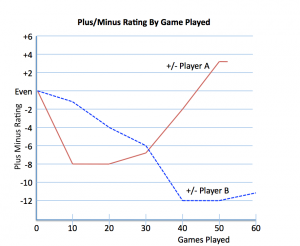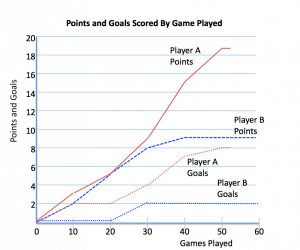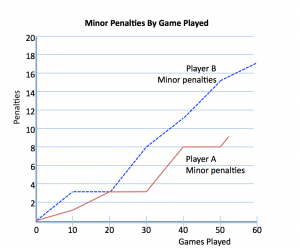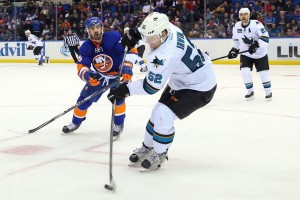“It was the best of times, it was the worst of times”. That famous Charles Dickens opening line pretty much described the Sharks playoffs a year ago versus the Kings, winning 3 straight and looking like it was the best of times, then losing 4 straight to make it the worst.
Out of that humiliating defeat, Sharks General Manager Doug Wilson made several changes. Among them, he committed to allow players to earn a spot with their play. In Wilson’s own words, players had no more “equity”, every job was open and play on the ice would determine who got a job and who didn’t. Wilson’s comments are in this hyperlinked video, the specific comments are at the 14 minute mark. It has now been a full season since those comments were made, the question is, was Wilson being honest?
The Players
I’ll compare the performance of two defensemen for the Sharks from this season. In the spirit of each player earning their own equity, independent of pedigree, I’ll leave the names out for now, though Shark fans may figure out the players I’m talking about quickly. By leaving the names out, we get to see perhaps more clearly who has earned a job and who has not. We can use this case study and the events that will play out over the next several weeks to see if Doug Wilson meant what he said. The case study is interesting for a few reasons. Both players are left-handed shots, both were on the last year of their deal this season and neither played with much with the Sharks top defenseman, Marc-Edouard Vlasic.

Last season, Player A played 53 games, while Player B played 60 games. I’ll start by looking at their plus-minus numbers. As the graph to the left shows, Player A started off miserably, a -8 in the first 10 games. Fortunately for him, that was rock bottom. The number stayed pretty flat for another 20 games, before rocketing upwards in the final 25 or so games. He finished at a +3, digging himself out of a pretty large hole.
Player B moved steadily downward for the first 40 games, bottoming out at -12 before stopping the slide and finishing the season finish at -11. The downward spiral ended, but there was no notable upward trend at any point during the season.

The scoring, measured in both goals and points, is in the graph to the right. In terms of scoring, both players contributed modestly for their first 20 or so games. Through about game 30, their point totals were nearly identical. After that, Player A took off and Player B flat-lined, adding just 1 assist in his last 30 games. In the end, Player A had twice the points (19) and 4 times the number of goals (8) compared to Player B.

The third area is penalties. The graph on the left covers this. Obviously, leaving your team short-handed is not a good idea. Once again, we see the two players relatively close 20 games in, but then separation occurs. Player B finishes the year with about twice as many penalties, 17 versus 9. Given the Sharks penalty kill, 8 additional minor penalties equates to approximately 2 goals.
Through game 20, both players were pretty similar in all 3 areas. After game 20, they diverged in a big way. 20 games in, both had taken 3 minor penalties. From that point on, Player A added 6 minor penalties compared to 14 for Player B. Through game 20, both players had 5 points. After game 20, Player A had 6 goals and 14 points, while Player B had just 2 goals and 4 points. Through game 20, Player A was -8, Player B was -4. After that Player A was +11 while Player B was -7.
In each major metric, Player A, after a rough start, got untracked and left Player B in the dust.
At the end of the season, players need to be evaluated. Player A was clearly superior, at least by the numbers. Watching the games, one would have likely come to the same conclusion: the numbers told the story reasonably well.
The Rest of the Story
I borrowed from Dickens to start this piece, now I’m borrowing from Paul Harvey, as it is time for the “rest of the story”. Player A is Matt Irwin, age 27. At this point, it is unclear if the Sharks will retain him: he is less than a day away from becoming an unrestricted free agency. Brenden Dillon is Player B. He is 24 and was on his way to becoming a restricted free agent until June 29, 2015, when Doug Wilson signed Dillon to a 5-year-deal, valued at over $16million.

Both players are young, with similar levels of NHL experience. Irwin has 166 games of NHL experience, Dillon 211. Both players are left-handed shots. In addition to Irwin and Dillon, the Sharks had 3 other left-handed defensemen play significant roles last season. Marc-Edouard Vlasic is a lock for the top defense pair and will be a starter next season. Scott Hannan, an elder statesman, will not be a starter next season, as Doug Wilson decided to not re-sign him. Mirco Mueller is on the opposite end of his career from Hannan. Though Mueller struggled as rookie, he is still just 20 years old and his future could be just about anything. Wilson traded up in round 1 for Mueller taking him 18th overall in 2013, the second highest draft pick he has used for a defenseman in his 13 drafts for the Sharks. There is no doubt Wilson has high expectations for the youngster. He is being counted on to fill a left-handed defenseman spot, if not immediately, then soon.

One would expect the team to carry 3 left-handed starters on defense going into next season. With Vlasic in one spot and Mueller in the other at some point soon, that leaves Dillon and Irwin for the final spot.
Irwin was clearly the better player for the Sharks last year, one could make the case he was the Sharks best even-strength defenseman in 2015, following a poor start in 2014 portion of the season. Irwin led the entire team in +/- from January through the end of the season and it was not close. His +11 was better vastly better than the Sharks stars: Vlasic (+1), Joe Pavelski (+4), Brent Burns (-3) and Joe Thornton (-9). His 14 points in the 2015 portion of the season was 2nd among Sharks defensemen, behind only Burns.
How this will all play out is still to be determined. Irwin may stay. Dillon is signed, but he could still be traded. If actions are taken at face value though, Irwin is out and Dillon is in.
Last June, Wilson made it clear that players would be given the chance to take a job. It was central to changing the culture; a player’s resume is what they put out on the ice, independent of prior history. Wilson’s exact words “there is no equity in anybody that has been here … you want to be a young defenseman and grab it, take it.” Irwin did ‘take it’. Dillon did not. But Dillon got a big contract, while Irwin is less than 24 hours away from being an unrestricted free agent.
Wilson has given fans reason to be skeptical; he has lost a lot of trust since the end of the Kings series a bit over a year ago. Sticking to his word means something, if to no one else, than to Sharks owner Hasso Plattner. Plattner trusts Wilson. How Wilson handles a situation like the one with Dillon and Irwin should be the sort of thing Plattner looks at closely when he evaluates Wilson. The owner is the only one who can hold Wilson accountable for his commitment to their agreed plan. Figuring out whether it should be Irwin or Dillon that gets retained, that decision should follow the blueprint Wilson and Plattner agreed upon. If that blueprint is essentially what Wilson told the public, then Wilson appears to be undermining that agreed-upon plan. If that is the case — and it appears that way at the moment — Hasso Plattner should be very troubled by the actions of his general manager.